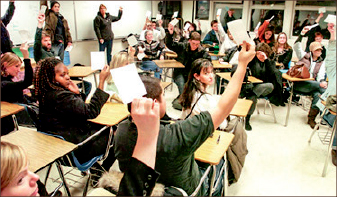PRIMARIES FOR DUMMIES

A continuing series Part 3
When the Republican Party held its first debate back in September, there were 15 candidates for the voters to choose from. However, the unequal influence wielded by early state primaries has caused that field to be narrowed to just four candidates based on the decisions made by voters in just three states.
The current schedule for primary elections puts a disproportionate amount of influence into the hands of early voting states. While this may seem like a trivial issue, consider this: If Iowa and the other early voting states are able to determine who gets to run for president, then does it really matter for them who wins? They have been given the ability to ensure that anyone who ends up running in the final election is favorable to them. In the words of Boss Tweed, the corrupt politician and head of the New York political machine in the 1860s and 1870s, “I don’t care who does the electing, so long as I get to do the nominating.”
In the early months of campaigns, candidates often focus the vast majority of their time and resources on these early states. A good showing in Iowa and New Hampshire is vital for a campaign’s longevity as the candidates with a good showing will receive more attention, credibility and votes in later elections. Along with the increased attention on early states comes an increased focus on the issues that matter to the people in those states as policies and campaign promises are made addressing issues deemed most important to those people. Meanwhile the interests and issues that are important to people voting toward the end of the political season are deemed less important.
Typically, a party’s nominee is determined by the end of March, as there will be a large enough margin between the candidates that the victory has either been secured or an upset has been rendered unlikely. As such, the votes of more than 500,000 caucus goers in Iowa have more influence in the presidential race than the more than five million Republican voters in California who do not get to vote in the primaries until June.
With every election, the issue of campaign reform is brought up and discussed, but nothing ever comes from it, partly because it is unclear who has the authority to legislate it. Each individual state and the parties within that state are in charge of determining whether they want a caucus or secret ballot, the distribution methods of delegates, and when the primary will be held. However, political parties have prevented states from having full control over when their elections are held.
In 2008 Florida moved its primary date to Jan. 29, ahead of Super Tuesday. Both the Republican and Democratic National Committees tried to block the move by threatening to take away Florida’s delegates. Ultimately Florida got its way and kept the Jan. 29 date. However, the altercation showed the favoritism of Iowa and New Hampshire, as they have been permitted to write into their state laws that they must hold their primary elections before anyone else.
It is clear that the primary voting system needs serious reform in order for the influence of voters across the country to be equalized. However, finding a solution is not as simple.
One proposed method would be a national primary voting day giving all states the same amount of influence over who enters the final election. The problem with this system is that it makes name recognition and money a key factor in the influence of a campaign. A single day of voting would make it more difficult for the unknown candidates to present their ideas and attract attention from voters, as they would not have the resources for a simultaneous campaign in 50 states.
The other proposed method is a rotating regional primary election schedule where the region of the country that votes first would change with each presidential election. While this method would share some of the flaws of the current system, including the increased influence of early voting states, the grouping would at least distribute that influence so that it is not solely in the hands of a single state.
While the need for change has been recognized, it is unlikely anything will be done to change the current voting system any time soon. More than 300 bills have been introduced to change the primary voting system, but not one of them has made it to the House or Senate floors for debate or a vote. After all, the people who have the ability to change the system are the same ones who benefit from it.
LAPP is a news reporter.
